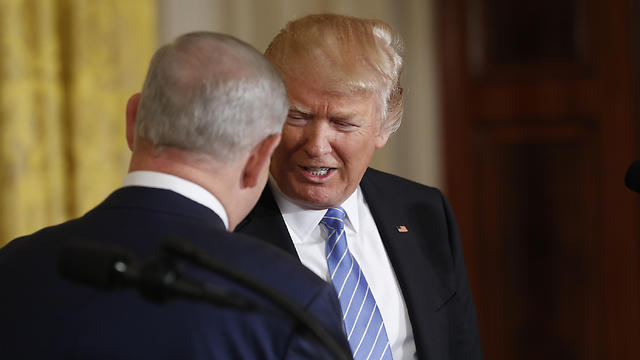
Israel in Trump’s eyes: An asset or a burden?
Analysis: The annexation and construction policy, alongside an implementation of the red lines on Iran, may lead to an escalation on the northern and Palestinian fronts, which is set to clash with the US president’s cost-benefit calculations and with Israel’s strategic value.
Before Prime Minister Benjamin Netanyahu left for his pivotal meeting with US President Donald Trump, he was heavily pressured by the settler leaders and their supporters to present a new agenda: Dropping the two-state vision, making moves to annex Area C and pushing for massive construction in the settlements. By doing so, they are hoping to put an end to any possibility of a future agreement with the Palestinians.
At the White House press conference, President Trump spoke about the need for a “deal” that Israel and the Palestinians have to agree on, and as far as he is concerned, it doesn’t matter if this deal is based on two states or one state, as long as the parties agree on it. He also asked the prime minister to “hold off” on the settlement construction.
Netanyahu chose his magic formula: Expanding the concept of security and the need for Israeli security control in all the area west of the Jordan River. Security also covers the main problem in his eyes—the Iranian threat—if the US fails to stop the ayatollahs from making a breakthrough towards a nuclear bomb, and blocks the growing negative Iranian influence in Israel’s close surroundings.

Four main objectives can be detected in the Trump administration’s policy in the Middle East: 1. A commitment to destroy the Islamic State; 2. stepping up the attitude towards Iran; 3. building a relationship with the region’s countries based on mutual returns (cost-benefit); 4. improving relations with Israel.
Netanyahu tried to gently tilt the scales and the American list of priorities towards curbing Iran, without Trump having to give up on his commitment to destroy ISIS. Assuming that Netanyahu managed to convince Trump to focus on the Iranian problem, disagreements are still expected between Jerusalem and Washington as to the way Tehran should be dealt with.
When it comes to the Syrian issue, for example, Israel stresses that preventing Iranian presence and the presence of Iran’s representatives in Syria is a condition in every future agreement, and the “red lines” it has set on Iranian and Hezbollah presence in southern Syria attest to that. It is not at all certain that the US will accept the Israeli demands on this issue, and there are signs that Trump may place the “Syria case” in Russia’s hands.
America’s relationship with Israel has been based on two layers throughout the years: Shared values and a joint strategic interest. As far as values are concerned, despite 50 years of controlling the Palestinian people in the West Bank, Israel remains a strong and stable democracy—the only democracy in the Middle East—which supports Western values. The supporters of annexation, who are interested in burying any option of an agreement with the Palestinians, are basically harming the values of democracy (for example, with the Regulation Law). At the same time, the US Jewry’s support keeps eroding, primarily among the young generation and in bipartisan support.
The strategic layer, until the 1990s, was based on the organizing framework of the Cold War and the fact that Israel was at the forefront of the battle against the Soviet Union’s influence in the Middle East. In the new era, the perception of Israel as an asset has diminished and an apparent misbalance has been created in the relations. While the US provides diplomatic, security and economic guarantees for Israel’s existence, Israel is not fulfilling its part of the deal—for example, when it comes to the Palestinian issue. And while Netanyahu used Trump’s language to talk about the “wide regional deal,” Israel is not wanted as a member in any framework of a regional coalition—not even the one being advanced by the US against ISIS—because it is not considered legitimate in the eyes of the Arab states, and mainly in the eyes of the Arab street, as long as no progress is made in solving the Palestinian problem.
The annexation and construction policy, alongside an implementation of the red lines on Iran, may lead to an escalation on the northern and Palestinian fronts. The potential of such an escalation is expected to clash with Trump’s cost-benefit calculations and with Israel’s strategic value—turning Israel from an asset into a burden. All signs indicate that when that happens, the American president will not hesitate to stand up against Israel.
Brigadier-General (res.) Udi Dekel is the managing director of the Institute for National Security Studies (INSS).










